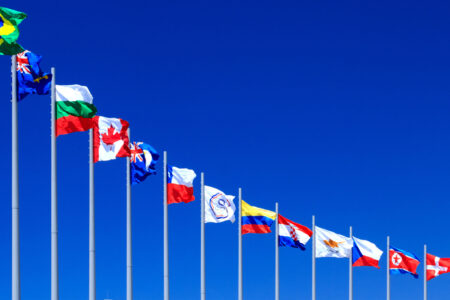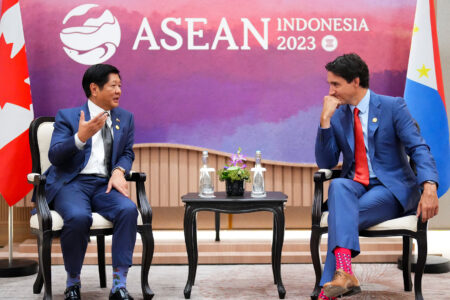
The two Michaels have safely returned to Canada. Does their return mark a new era in Canada-China relations? Can bilateral relations return to where they were prior to their arrest? How was the affair perceived by other countries?
The fact that the timing of the Michaels’ release followed immediately from Huawei CFO Meng Wanzhou’s return to China suggests the two sets of cases are inherently linked. Even though all the parties involved ─ the U.S., China and Canada ─ have denied any such connections, it is hard not to deduce they comprised a political bargain, one that traded the freedom of two Canadian citizens for that of a prominent Chinese business executive.
Canada’s perspective
The arbitrary detention of the two Michaels for more than 1,000 days in Chinese prisons has had a profound impact on Canadians’ opinions of China. It has also elevated relations with China from an esoteric foreign policy discussion to mainstream public discourse. After Meng was arrested, and amid perceptions that China mishandled the COVID-19 outbreak, Canada’s attitude toward China changed. The pendulum of public opinion swung from a majority holding favourable views to a majority holding unfavourable views of China. This drove the major political parties in Canada to take on the China issue in the election, and they universally adopted a “let’s get tough on China” stance. The Liberal Party, which campaigned on building closer trading relations and ties with China before it won power in 2015, has also shifted to a tougher position. Overall, Canadians’ eyes have been opened to the increasingly bellicose nature of the rising Chinese power.
I would argue that Canada has appeared a victor in this saga. The reason is simple. Canada fulfilled its treaty obligations by arresting Meng at the request of the U.S. authorities. Canada’s minister of justice and the U.S. attorney general flatly refused to intervene in the judicial process, even though the U.S. was under pressure to let Meng go as a quid pro quo for the two Michaels’ freedom.
Canada upheld the rule of law throughout the process and refused to cave in, even under intense domestic political pressure. Any claim that Canada has come out of the saga as less of a country is misplaced. All the legal cases were politically motivated, and Canada followed the appropriate legal procedures, leaving political intervention in the rule of law to the U.S. and China. This is exemplary behaviour, given Ottawa’s limited wiggle room.
China’s perspective
From the perspective of the Chinese authorities, the arrest of Meng was part of a U.S. effort to contain the growth of the Chinese global technology powerhouse; witness what the U.S. did with another Chinese technology firm, ZTE, a few years ago.
In the current instance, the U.S. pressured Canada to do its bidding, and this was translated by China into an effort by a U.S. ally to encircle it. With this narrative, the Chinese government is able to shape public opinion by stoking nationalism against the Western conspiracy to contain China. The fact that Meng’s return to China was given red carpet treatment, and displayed as a triumph of China’s international prowess and nationalist sentiment, is an indication of the power of the Chinese Communist Party’s propaganda machinery.
However, China’s international reputation and any attempt on its part to project “soft power” have taken a huge toll. It is now labelled, along with Iran and Russia, as a country that takes hostages. When considered together with its human rights abuses in Xinjiang, the Uyghur region in the northwest, and the political crackdown in Hong Kong, China’s international notoriety has been ratcheted up.
The future of Canada-China relations
This bilateral relationship will never be the same. It will be extremely difficult to wipe the two Michaels imprisonment, which dominated national headlines for nearly three years, from our national memory. The biggest challenge moving forward is balancing our trade and business interests, the need to work with China on climate change, people-to-people exchanges such as those in international education and research, where there were legitimate and serious concerns over human rights violations, trade coercion and arbitrary detentions.
For a long time, liberalists in the West have held out hope that trading with China and fostering closer ties would force it to become more politically open (if not turn it into a democracy). In the last few years under President Xi, this has turned into a pipedream. Now the two Michaels saga has accentuated the imperative to think about a new, rational and strategic approach to be able to engage with China more effectively.
At one level, the two Michaels saga can be seen as the collateral damage resulting from U.S.-China competition. As I have previously argued, Canada is caught in the middle and has become the battleground of this war between the two superpowers; a war that neither power wants to fight on its home soil.
It is crucial that we differentiate Canada’s strategic interests from those of the U.S. Even though the U.S. is our key political ally and a major trading partner, U.S.-China relations are now dominated by competition in wide-ranging areas, from military to trade and technology. This is not Canada’s position. On trade, Canada’s agricultural production is still very much in tune with China’s economic demands. And Canada has no stake in the military or technology rat race. Therefore, in our relations with China, we need to have more independent thinking, and to chart a bold path that reflects our own strategic interests and national priorities.










